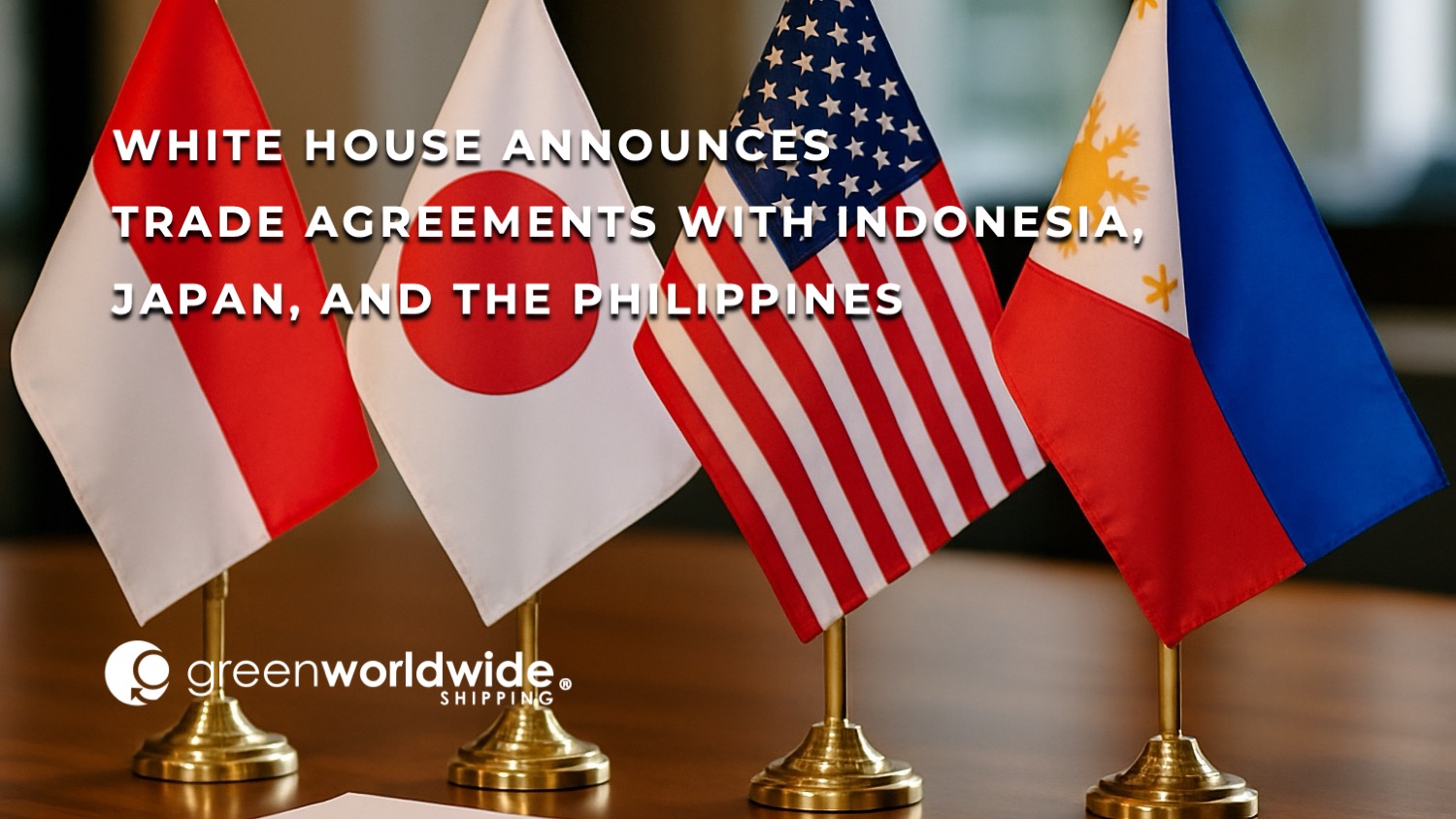RECIPROCAL TRADE AGREEMENTS WITH INDONESIA, JAPAN, AND PHILIPPINES ADVANCE U.S. EXPORT ACCESS
The White House has confirmed three new reciprocal trade arrangements designed to expand U.S. export opportunities and address longstanding tariff imbalances with key Indo-Pacific partners. A formal framework has been released for an Agreement on Reciprocal Trade with Indonesia, while trade agreements with Japan and the Philippines were also announced by the White House on July 22, 2025.
Each arrangement introduces a reciprocal tariff structure and includes commitments to reduce market access barriers, strengthen cooperation, and support aligned regulatory practices in strategic sectors such as agriculture, digital trade, energy, and manufacturing.
U.S.-INDONESIA FRAMEWORK ESTABLISHES TARIFF RELIEF
According to the official joint statement and fact sheet published by the White House on July 22, 2025, Indonesia has agreed to eliminate approximately 99% of tariff barriers for U.S. exports.
The framework outlines the following sector-specific and structural commitments:
- Removal of tariff and non-tariff barriers across industrial, agricultural, medical, and automotive goods
- Exemption from Indonesia’s import licensing regimes, including its commodity balance policy
- Recognition of U.S. regulatory standards for FDA-authorized goods and federal motor vehicle safety standards
- Permanent Fresh Food of Plant Origin (FFPO) designation for eligible U.S. plant products
- Acceptance of U.S. certificates for meat, poultry, and dairy facility listings
Indonesia will also lift pre-shipment inspection requirements, eliminate licensing restrictions on remanufactured goods, and adopt regulatory practices intended to streamline customs compliance and product certification for U.S. exporters.
“Today, the United States of America (the United States) and the Republic of Indonesia (Indonesia) agreed to a Framework for negotiating anAgreement on Reciprocal Trade to strengthen our bilateral economic relationship, which will provide both countries’ exporters unprecedented access to each other’s markets.”
Joint Statement on Framework for United States-Indonesia Agreement on Reciprocal Trade | White House | July 22, 2025
U.S.-INDONESIA DIGITAL TRADE, SUPPLY CHAIN, ENVIRONMENTAL, AND LABOR COOPERATION COMMITMENTS
The agreement includes provisions to eliminate duties and declaration requirements for intangible products, such as software and media, and supports a permanent moratorium on customs duties for electronic transmissions at the WTO. Indonesia will also recognize U.S. data protection adequacy under its domestic law, enabling lawful transfer of personal data between the two countries.
Indonesia will remove export restrictions on industrial commodities, including critical minerals, and join the Global Forum on Steel Excess Capacity. Additional provisions include cooperation on export controls, investment security, and enforcement against duty evasion.
Labor commitments include a national prohibition on the import of goods made with forced or compulsory labor, protection of freedom of association, and increased enforcement of labor standards. Environmental provisions include full implementation of the WTO Agreement on Fisheries Subsidies, enhanced forest sector governance, and measures to combat illegal fishing and wildlife trafficking.
U.S.-INDONESIA COMMERCIAL AGREEMENTS AND TRADE BALANCE
The U.S.-Indonesia framework is accompanied by commercial commitments valued at over $22 billion, including:
- $3.2 billion in aerospace procurement
- $4.5 billion in agricultural purchases (soybeans, wheat, cotton)
- $15 billion in energy imports (LPG, crude oil, gasoline)
The United States recorded a $17.9 billion goods trade deficit with Indonesia in 2024, making it the fifteenth largest by value.
WHITE HOUSE ANNOUNCES JAPAN TRADE DEAL VIA SOCIAL MEDIA
Also on July 22, 2025, the White House announced a separate trade agreement with Japan via social media. According to that statement, Japan has agreed to:
- Apply a 15% reciprocal tariff on U.S. goods
- Open its market to U.S. automobiles, rice, and select agricultural products
- Reduce automotive tariffs from 25% to 15%, inclusive of the existing 2.5% MFN rate, with no quota
- Support future Section 232 tariffs on semiconductors and pharmaceuticals at a 15% rate
The White House also indicated that Japan would invest $550 billion into U.S. sectors, with the United States expected to receive a 90% share of the profits from that investment. No official joint statement or treaty documentation has been published to date.
PHILIPPINES COMMITS TO ZERO-TARIFF OPEN MARKET FOR U.S. EXPORTS
The White House also announced a reciprocal trade agreement with the Philippines. Under the terms described, the Philippines will grant full open market access to U.S. exports at zero tariffs. In return, the United States will apply a 19% reciprocal tariff on goods originating from the Philippines.
The White House further noted that the agreement includes a cooperative military component, with both nations committing to deepen strategic engagement alongside expanded bilateral trade. No formal treaty text or joint statement has been issued at this time.
NEXT STEPS FOR U.S.-ASIA TRADE STAKEHOLDERS
Final negotiations and legal formalities are underway to memorialize the U.S.-Indonesia Agreement on Reciprocal Trade. Implementation is expected to proceed following domestic approval processes. For Japan and the Philippines, further guidance is anticipated once treaty text or agency-level documentation becomes available.
U.S. importers and exporters are advised to prepare for updated certificate of origin requirements, sector-specific tariff schedules, and enhanced compliance mechanisms across all three trade partnerships as official details are finalized.
Stay up-to-date on freight news with Green’s Weekly Freight Market Update by following us on LinkedIn. For continuous updates, make sure to check out our website at greenworldwide.com.





